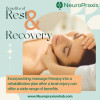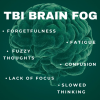Depression is a mental health disorder that negatively affects your feelings, thoughts, and behaviors. It is characterized by persistent feelings or moods of sadness and loss of interest that can interfere with daily functioning. Symptoms of depression may include:
- Feeling sad, hopeless, or depressed
- Loss of interest or pleasure in usual activities
- Changes in appetite (i.e., weight loss or weight gain unrelated to diet)
- Difficulty sleeping or sleeping too much
- Loss of energy or feeling fatigued
- Difficulty concentrating or making decisions
- Feeling worthless or guilty
- Restless movements (i.e., fidgeting, pacing, handwringing) or slowed movements
- Slowed speech
- Suicidal thoughts
Depression is common amongst individuals with TBI. There are many factors that can contribute to depression after TBI, but they vary from person to person. Some of these factors include:
| Factor | Description |
| Physical changes in the brain due to injury | Damaged areas of the brain that control emotions can cause depression. Changes in levels of some natural chemicals in the brain (neurotransmitters) can also cause depression. |
| Emotional response to injury | A person with TBI can have difficulty adjusting to his or her disability, limitations, and/or changes in family/society roles, which can lead to depression. |
| Other factors unrelated to injury | Other factors such as genetics or family history can increase someone’s risk of getting depression. |
General strategies that individuals with TBI can use to cope with depression are:
- Yoga, meditation, or exercise
- Practice deep breathing
- Eat healthy meals
- Get good sleep
- Manage your stress levels
- Attend support groups
- Stay connected: Talk to a friend or family member who you like and trust about your feelings
- Pick up a new hobby or try to engage in activities you used to enjoy
- Recognize negative thoughts and challenge these thoughts
- Make a wellness toolbox: Create a list of things you can or like to do that can quickly boost your mood (i.e., take a walk, play with your dog, watch a funny movie) and implement these ideas whenever you can.
- Seek professional help (i.e., a psychologist)
References:
https://msktc.org/tbi/factsheets/depression-after-traumatic-brain-injury
https://www.helpguide.org/articles/depression/coping-with-depression.htm
For more TBI Glossary Terms, click here.



